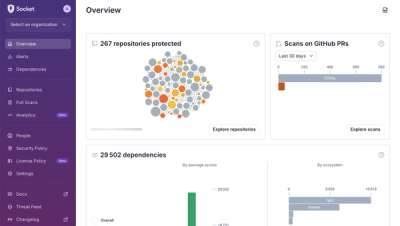
Research
wget to Wipeout: Malicious Go Modules Fetch Destructive Payload
Socket's research uncovers three dangerous Go modules that contain obfuscated disk-wiping malware, threatening complete data loss.
@basic-streams/ap
Advanced tools
ap<T, U>(streamf: Stream<(x: T) => U>, streamv: Stream<T>): Stream<U>
Creates a stream that will contain values created by applying the latest
function from streamf to the latest value from streamv every time one of
them updates.
import fromIterable from "@basic-streams/from-iterable"
import ap from "@basic-streams/ap"
const streamf = fromIterable([x => x + 2, x => x - 2], 10000)
const streamv = fromIterable([1, 2, 3], 8000)
const result = ap(streamf, streamv)
result(x => {
console.log(x)
})
// > 3
// > 4
// > 0
// > 1
// x => x + 2 x => x - 2
// streamf: _________._________.
// streamv: _______1_______2_______3
// result: _________3_____4___0___1
FAQs
ap operator for basic-streams
We found that @basic-streams/ap demonstrated a not healthy version release cadence and project activity because the last version was released a year ago. It has 1 open source maintainer collaborating on the project.
Did you know?

Socket for GitHub automatically highlights issues in each pull request and monitors the health of all your open source dependencies. Discover the contents of your packages and block harmful activity before you install or update your dependencies.

Research
Socket's research uncovers three dangerous Go modules that contain obfuscated disk-wiping malware, threatening complete data loss.

Research
Socket uncovers malicious packages on PyPI using Gmail's SMTP protocol for command and control (C2) to exfiltrate data and execute commands.

Product
We redesigned Socket's first logged-in page to display rich and insightful visualizations about your repositories protected against supply chain threats.